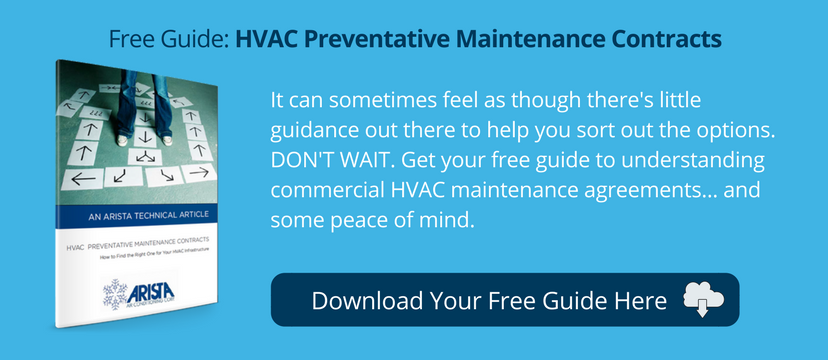Entering into an agreement to have your HVAC systems maintained by professionals is a wise business decision–no matter what your industry may be. Common knowledge would dictate that when you have reliable experts undertaking repairs and handling preventative, you’re less likely to experience problems that can affect your company’s bottom line. However, as with any important contract, there are a few points to consider regarding HVAC maintenance agreements.
1. Understand that hard costs are only part of the picture.
The cost of HVAC equipment comes, understandably, with a fairly high price tag, and you’re probably willing to accept it as the cost of doing business. Consider your investment, and what costly repairs could mean down the line. Consider the consequences of not having proper service; what does lengthy downtime mean for your bottom line?
2. Don’t underestimate the importance of soft costs.
What does your business lose when your HVAC systems are not operating at optimal levels? A growing body of research indicates that you could lose customers if your premises aren’t comfortable. That’s a big problem if you’re waiting hours–or even days –for a service visit because you don’t have the priority status associated with a maintenance agreeement.
3. If green initiatives matter to you, review your contract to make sure that environmentally safe products will be used when your HVAC equipment is being serviced.
And ask questions about your vendor’s in-house green iniatives. If a company is willing to invest in their own eco-conscious infrastructure, they’re more likely to recognize that operating environmentally-friendly systems is important to business owners, and are likely to step up to the demand.
4. Seek out HVAC maintenance agreements with companies that have a solid inventory of parts for your equipment.
Ordering parts can take days, increasing your downtime and costing you in lost business. Find a company that stocks the parts, so you don’t have to have them ordered.
5. Find out about a provider’s priority arrangement for customers with preventative maintenance contracts.
Though companies with ongoing HVAC maintenance agreements can typically rely on quicker response time by their providers, ask what circumstances would nullify that arrangement. Vendor transparency is key to a successful long term relationshiop.
6. Know that businesses are at a high risk without HVAC maintenance agreements in place.
Your boutique may be posh and your health club may be exclusive, but patrons will leave if the temperature is uncomfortable. Even worse, they’ll tell their friends about their bad experience. It’s these kinds of hidden costs that can have tough consequences for business owners–particularly in New York City, where competition is high. Your HVAC company shouldn’t be where you lose the edge.
7. Most HVAC maintenance agreements will include a checklist that will be performed during each visit.
Ask to see the list, and compare it to other companies if you’re shopping around. Avoid companies that don’t offer this supporting documentation, as this may be evidence of poor performance.
8. Make sure that the HVAC maintenance agreement is specific.
Find out what tasks will be performed and how often. Also, find out how long maintenance visits will take and ask whether they can be handled during hours when your business is closed.
Companies that avoid a maintenance agreement because they consider only its upfront cost would be wise to consider what costly downtime, poorly operating equipment and inability to maintain a comfortable temperature for customers and patrons could mean. Finding the right HVAC vendor and maintenance agreement ensures you minimize soft costs associated with your HVAC system and you can do more of what you do best–run your business.
To learn more about how a preventative maintenance agreement could help you avoid losing money, time and customers, grab a copy of our latest white paper, Calculating the Hidden Costs of Poor HVAC Maintenance.

